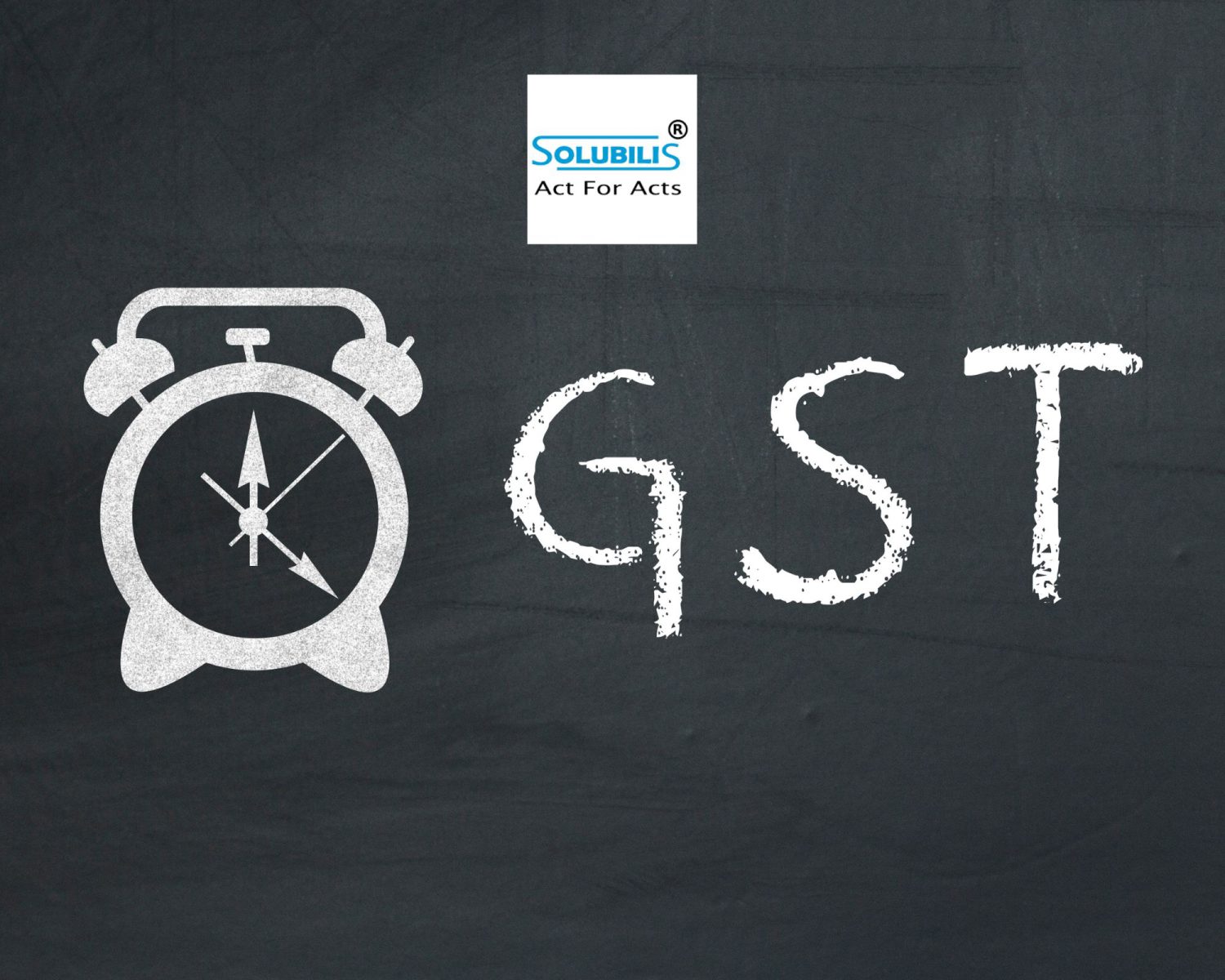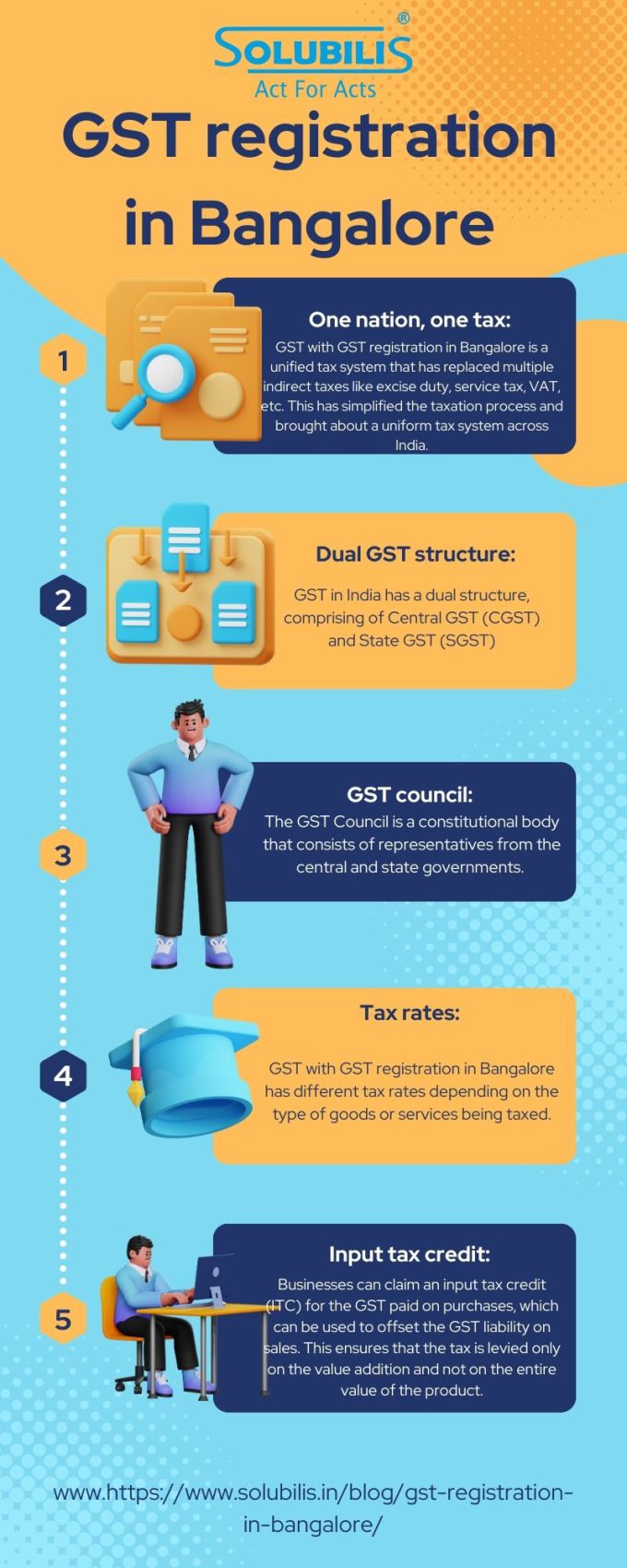GST registration in Bangalore

GST (Goods and Services Tax) is a value-added tax levied on the supply of goods and services in India. Businesses with an annual revenue of more than Rs. 10,000 are required to register for the GST. 20 million (Rs. 10 lakhs for businesses in the states to the north-east).
The following are the steps to register for GST in India:
Obtain a PAN (Permanent Account Number) card:
PAN is mandatory for GST registration in Bangalore.
Obtain a digital signature:
A digital signature is required for GST registration. The registration can be obtained from any authorized agency.
Apply for GST registration:
The application can be submitted online through the GST portal. The applicant needs to provide their mobile number, and email ID to start the registration process.
Once the application is submitted for GST registration in Bangalore, a GST officer will verify the details and may request additional information.
Provide additional information:
The GST officer may ask for additional information such as proof of business ownership, bank account details, and address proof.
GST registration certificate:
Once the GST officer verifies the details, a GST registration certificate is issued. The certificate contains an identification number called the GSTIN (Goods and Services Tax Identification Number). GSTIN is assigned to the business.
It is important to note that GST registration in Bangalore is mandatory for certain businesses, and failure to register can result in penalties and legal consequences.
Additionally, GST returns need to be filed regularly, even if there are no transactions during the period. It is advisable to consult with a tax professional or visit the official GST portal for further information.
Reverse charge mechanism
The Reverse Charge Mechanism (RCM) is a method of tax collection where the recipient of the goods or services is liable to pay the tax, instead of the supplier.
This mechanism is applicable when the supplier is not required to register under the Goods and Services Tax (GST) regime or is not registered under GST.
Under the RCM, the recipient of the goods or services needs to pay the tax directly to the government and then claim an input tax credit for the same.
The tax liability under RCM is similar to the tax liability of the supplier in a regular transaction. RCM is applicable for both goods and services, and the registered businesses must comply with the RCM provisions.
In India, the following are some of the situations where the RCM provisions apply:
Purchase from an unregistered dealer:
If a registered business purchases goods or services from an unregistered dealer, the recipient of the goods or services is liable to pay the tax under RCM.
Services received from overseas:
If a registered business receives services from an overseas supplier, the recipient of the services in India is liable to pay the tax under RCM.
Purchase from a composition scheme dealer:
If a registered business purchases goods or services from a composition scheme dealer, the recipient of the goods or services is liable to pay the tax under RCM.
Purchase of specific goods or services:
The government may notify certain goods or services where RCM is applicable, irrespective of the status of the supplier.
It is important to note that the RCM provisions apply only to registered businesses. Businesses that have an annual turnover of less than Rs. 20 lakhs (Rs. 10 lakhs for businesses in the northeastern states) are exempt from GST registration in Bangalore.
Thus, the Reverse Charge Mechanism is an important provision under the GST regime in India. It is applicable in specific situations where the recipient of the goods or services is liable to pay the tax instead of the supplier.
Businesses need to comply with the RCM provisions and pay the tax directly to the government to avoid penalties and legal consequences.
Salient features of GST in India

One nation, one tax:
GST with GST registration in Bangalore is a unified tax system that has replaced multiple indirect taxes like excise duty, service tax, VAT, etc. This has simplified the taxation process and brought about a uniform tax system across India.
Dual GST structure:
GST in India has a dual structure, comprising of Central GST (CGST) and State GST (SGST). CGST is collected by the central government, while SGST is collected by the state governments. This ensures that the revenue generated through GST is shared by both the central and state governments. Thus GST registration in Bangalore is necessary.
GST council:
The GST Council is a constitutional body that consists of representatives from the central and state governments.
The council is responsible for taking decisions on tax rates, exemptions, threshold limits, etc.
Tax rates:
GST with GST registration in Bangalore has different tax rates depending on the type of goods or services being taxed. The tax rates are divided into five slabs, ranging from 0% to 28%, with the majority of goods and services falling under the 18% and 12% slabs.
Input tax credit:
Businesses can claim an input tax credit (ITC) for the GST paid on purchases, which can be used to offset the GST liability on sales. This ensures that the tax is levied only on the value addition and not on the entire value of the product.
GST returns:
Businesses registered under GST need to file monthly, quarterly, and annual returns, depending on their turnover. The GST returns provide details of the transactions made during the period, and the GST liability is calculated based on the information provided in the returns. GST return is possible when you get GST registration in Bangalore.
E-way bill:
When goods worth more than Rs are transported, an electronic way bill must be created. 50,000. The e-way bill contains details of the consignment, supplier, recipient, and transporter. This helps in preventing tax evasion during the transportation of goods.
GST compliance:
GST compliance refers to adhering to the rules and regulations of the GST regime, such as timely filing of GST returns, payment of taxes, maintenance of records, etc. It is also useful for GST registration in Bangalore.
Failure to comply with GST regulations can result in penalties and legal consequences.
Auto-population of input tax credit:
To reduce the compliance burden for taxpayers who have GST registration in Bangalore, the GST Council implemented the auto-population of input tax credit facility in the GST portal.
The facility will allow taxpayers to claim the input tax credit on purchases automatically, based on the details furnished by their suppliers.
Amendment in GST laws:
The GST Council introduced several amendments to the GST laws, including the amendment to section 50 of the CGST Act, which relates to interest on delayed payment of GST.
The amendment clarified that interest on delayed payment of GST will be charged only on the net tax liability, after deducting the input tax credit.
Conclusion
In conclusion, GST registration in Bangalore is a mandatory requirement for businesses operating in India that meet the threshold turnover limit. The registration process is online and requires businesses to provide certain details and documents to complete the registration.
Once registered, businesses must comply with the GST laws and file GST returns on time to avoid penalties and legal consequences.
The GST regime in India has undergone several changes and updates since its implementation in 2017, to simplify the tax system and reduce the compliance burden on businesses.
Businesses need to stay updated on the latest developments in GST to ensure compliance and avoid any legal issues. Overall, GST registration in Bangalore and compliance play a crucial role in the smooth functioning of businesses in India and contribute to the growth of the economy.

